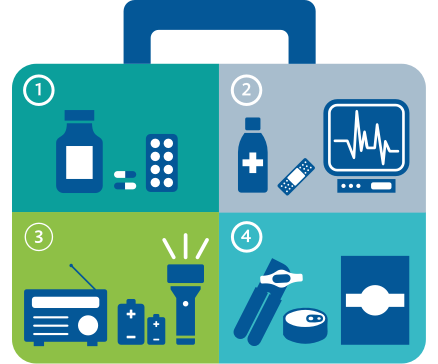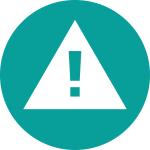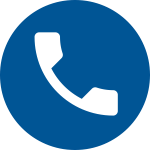How To Prepare in Case of Emergency
By planning ahead and having an emergency kit on hand, you’ll be ready to handle anything that comes your way. Disasters of all kinds can wreak havoc on the lives of people affected—but for 450,000+ people on dialysis in the US, emergency situations can pose a different kind of danger. Closed roads, power outages and other fallout can prove life-threatening when they prevent someone from receiving dialysis.
Plan ahead!
The time to prepare for any disaster is when there’s not one—especially if you’re on dialysis. Take some simple steps now and you’ll have the tools and resources ready, should you ever need them. You’ll also have the peace of mind that comes with having a well-thought-out backup plan.Emergency kit: know what to pack
You’ll need to take precautions and gather information and supplies to be ready in case of an emergency.
- An extra 3-day supply of all medicine (for dialysis and any other conditions)
- Necessary medical supplies and dialysis equipment
- A radio, flashlight and batteries so you can keep up with the news
- At least 3 days’ worth of food that fits the Emergency Eating Plan provided to you by your dietitian
Keep emergency supplies and information in a backpack or duffel bag—something that’s easy to grab and go. Know where your emergency kit is at all times.
Have up-to-date personal information—ID, medication and allergy lists, insurance card, emergency contact details, your doctor’s number, dialysis treatment information and the Fresenius Kidney Care Hotline number (1-800-626-1297). You’ll want a paper list so it’s easy to access.
Create your personal information list with this form
Create your personal information list with this form
Update your contact information with your dialysis center—make sure your treatment team is able to reach you if there’s a need.
Have an evacuation plan—if there’s an emergency or disaster in your area and you need to leave your home, have a destination and make an evacuation plan. Share your plan with friends and family—and let them know how they can help.
Know your emergency medication adjustments—ask your doctor if any medications should be adjusted in extreme circumstances, especially if you have diabetes.

Starting dialysis? Take a free class
Learn how to feel your best and thrive on dialysis. Choose the class format that fits your life—educator-led or self-guided.
Sign up now
Don’t forget
- If you’re getting treatment at a dialysis center—arrange with a friend, neighbor or family member for backup transportation to and from your clinic. Call the Fresenius Kidney Care Emergency Hotline at 1-800-626-1297.
- If you’re getting treatment at home—be ready to follow all the directions given to you during home training for continuing dialysis in an emergency, and stay in contact with your nurse.

Stay aware
Many emergencies are unpredictable, but you should be aware of any known situations that could potentially interrupt your treatment. Follow local TV and radio stations for severe weather warnings and delays around where you live and near your clinic. Our website will also broadcast emergency alerts.
Priority: have the right food
In case of disaster, you may not be able to cook or eat as you usually do. If you miss a dialysis treatment, you will need to follow a strict diet—especially if you have diabetes.
- Stick to your Emergency Eating Plan—and check in with your dietitian
- If you lose power, most food in your refrigerator and freezer will be good for 1–2 days—if you aren’t sure of its freshness, don’t eat it
- Consume food from the fridge before shelf-stored food
- Do not drink more than 2 cups of fluid a day—chewing gum can help relieve thirst
- Do not use salt or salt substitutes
- Stock canned food that fits your eating plan—choose no- or low-salt, no- or low-sugar and preservative-free options
- Avoid high-potassium foods like potatoes, bananas and tomatoes
- Supplies to keep on hand:
- Bagged ice and a cooler—to help keep food cold longer in case of loss of power
- 3 or more gallons of water for drinking, cooking and bathing
- A can opener
- 3 days’ worth of food from your Emergency Eating Plan


